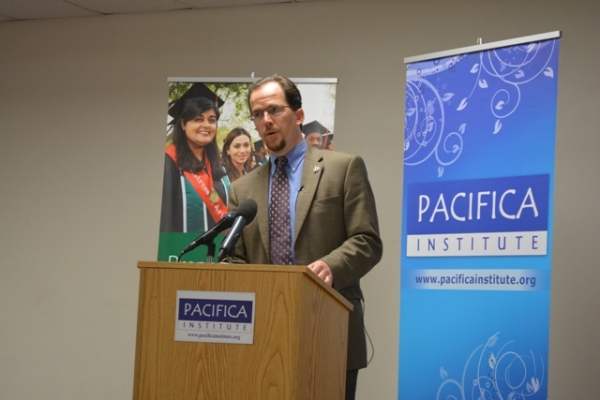On Thursday, September 25, Pacifica Institute hosted Dr. Joseph Lumbard, assistant professor of classical Islam at Brandeis University, and visiting faculty at Bayan Claremont Islamic Graduate School. His research focuses on Islamic intellectual traditions, with a particular emphasis on Sufism and Islamic philosophy. He is the editor of “Islam, Fundamentalism and the Betrayal of Tradition,” a collection of essays that examines the religious, political, and historical factors that have led to the rise of Islamic fundamentalism. He is currently researching the development of Sufi theories of love in the early Islamic period and their influence on the Persian Sufi tradition. He completed his PhD at Yale University in 2003.
Dr. Lumbard spoke on the role of the covenant in revitalizing the heart of Islam. The idea of the covenant within the Qur’an is essential to understanding the human condition. The covenant is our personal relationship with God, embodied in our hearts. And covenantal pluralism is a dialogue shared among Jews, Christians, and Muslims.
Dr. Lumbard argues that the Qur’an is more pluralistic than the other Abrahamic books. He cited Qur’an 7:172 in which God asks his people “Am I not your Lord?” and they respond “Yes, we do testify.” This declaration of “yes” is just a reaffirmation of an initial, primordial covenant. This covenant, which took place between God and his people, was made before we were here in this world, and is expanded to all humanity. Lumbard states, “all humans bear the imprint of the initial pre-temporal covenant within, so all are held accountable.”
Dr. Lumbard tells of a second covenant that is a recognition, renewal, and continuation of the initial, “general covenant”. This “particular covenant” was made while humans were here in this world, and is in adherence through the revealed prophets. It is an internal Qur’anic theology of religious pluralism. The Qur’an doesn’t claim to establish a new covenant, but rather affirms the general covenant. It is a comprehensive Islamic theology that aligns with Classical interpretations of the Qur’an, and comes completely from within the Islamic tradition.
Dr. Lumbard closed by stating that within our hearts, all people have the fundamental aptitude for seeing the truth and living in accord with the covenant. We are all susceptible of swerving away, but we continuously bear that imprint, as well as the ability to remember, renew, and return to God.
Pacifica Institute would like to thank Dr. Lumbard for his presentation, Bayan Claremont Islamic Graduate School for partnering with us, and our audience members for participating in our Lecture Series.

